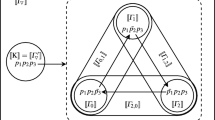Abstract
This paper extends a programming language for implementing cognitive agents with the capability to explicitly represent beliefs and reason about them. In this programming language, the beliefs of agents are implemented by modal logic programs, where beliefs are represented by explicit modal operators. A distinction is made between a belief base language that can be used to represent an agent’s beliefs, and a belief query language that can be used to express queries to the agent’s belief base. We adopt and modify a proof procedure that decides if a belief query formula is derivable from the belief base of an agent. We show that the presented proof procedure is sound.
Preview
Unable to display preview. Download preview PDF.
Similar content being viewed by others
References
Dastani, M., van Riemsdijk, B., Dignum, F., Meyer, J.J.: A programming language for cognitive agents: Goal directed 3apl. In: Dastani, M.M., Dix, J., El Fallah-Seghrouchni, A. (eds.) PROMAS 2003. LNCS (LNAI), vol. 3067, pp. 111–130. Springer, Heidelberg (2004)
The Foundation for Intelligent Physical Agents (Fipa communicative act library specification)
Baldoni, M.: Normal Multimodal Logics: Automatic Deduction and Logic Programming Extension. PhD thesis, University of Turin, Italy (1998)
Nguyen, L.A.: The modal logic programming system MProlog. In: Alferes, J.J., Leite, J. (eds.) JELIA 2004. LNCS (LNAI), vol. 3229, pp. 266–278. Springer, Heidelberg (2004)
Nonnengart, A.: How to use modalities and sorts in prolog. In: MacNish, C., Pearce, D., Pereira, L.M. (eds.) Logics in Artificial Intelligence, pp. 365–378. Springer, Heidelberg (1994)
Nguyen, L.A.: Multimodal logic programming and its applications to modal deductive databases. Technical report (2003)
Baldoni, M., Giordano, L., Martelli, A.: A modal extention of logic programming: Modularity, beliefs and hypothetical reasoning. Journal of Logic and Computation 8, 597–635 (1998)
Baldoni, M., Giordano, L., Martelli, A.: A framework for modal logic programming. In: Maher, M. (ed.) Proc. of the Joint International Conference and Symposium on Logic Programming, JICSLP 1996, pp. 52–66. MIT Press, Cambridge (1996)
Baldoni, M., Giordano, L., Martelli, A.: Translating a modal language with embedded implication into horn clause logic. In: Extensions of Logic Programming, pp. 19–33 (1996)
Blackburn, P., de Rijke, M., Venema, Y.: Modal Logic. Cambridge Tracts in Theoretical Computer Science, vol. 53. Cambridge University Press, Cambridge (2001)
Author information
Authors and Affiliations
Editor information
Editors and Affiliations
Rights and permissions
Copyright information
© 2006 Springer-Verlag Berlin Heidelberg
About this paper
Cite this paper
Winkelhagen, L., Dastani, M., Broersen, J. (2006). Beliefs in Agent Implementation. In: Baldoni, M., Endriss, U., Omicini, A., Torroni, P. (eds) Declarative Agent Languages and Technologies III. DALT 2005. Lecture Notes in Computer Science(), vol 3904. Springer, Berlin, Heidelberg. https://doi.org/10.1007/11691792_1
Download citation
DOI: https://doi.org/10.1007/11691792_1
Publisher Name: Springer, Berlin, Heidelberg
Print ISBN: 978-3-540-33106-3
Online ISBN: 978-3-540-33107-0
eBook Packages: Computer ScienceComputer Science (R0)




